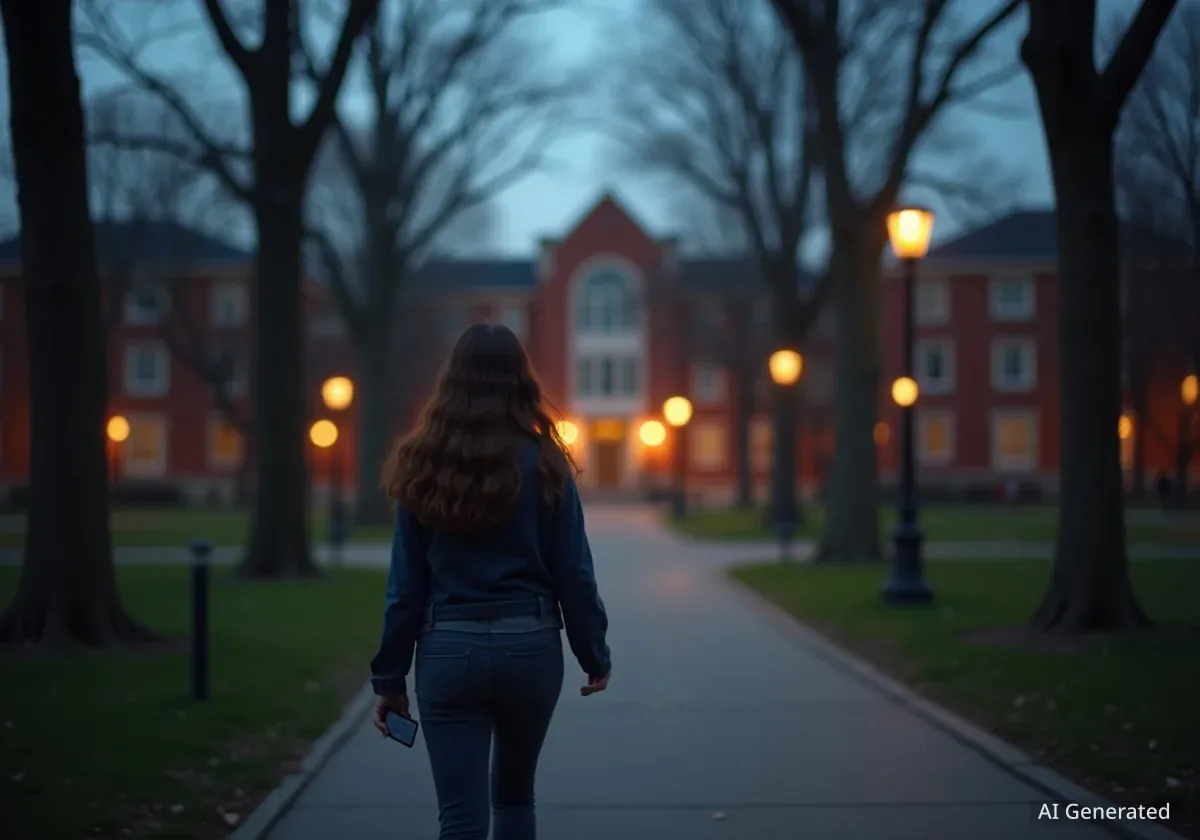Liverpool John Moores University (LJMU) has introduced a new mobile application, SafeZone, to enhance student safety as the city prepares for shorter daylight hours. The app provides students and staff with a direct link to campus security and support services 24 hours a day, seven days a week.
The initiative is part of a broader university strategy to improve student wellbeing, which also includes significant upgrades to its platform for reporting sexual misconduct. University officials are encouraging all members of the LJMU community to familiarise themselves with these new resources.
Key Takeaways
- Liverpool John Moores University has launched the SafeZone app to improve student safety on and off campus.
- The app offers 24/7 access to campus security, location sharing in emergencies, and wellbeing support.
- LJMU has also enhanced its 'Report and Support' platform, allowing for anonymous reporting of sexual misconduct.
- These measures are being highlighted as daylight hours decrease, a time when personal safety concerns often increase.
Introducing the SafeZone App
As autumn approaches and evenings grow darker, personal safety becomes a more prominent concern for students commuting across Liverpool. In response, LJMU has rolled out the SafeZone app, a free tool designed to provide a rapid connection to university support systems whenever it is needed.
The application is available for both students and staff and can be downloaded from the Google Play and Apple App Stores. Its primary function is to act as a digital safety net, connecting users directly with the university's security team with a simple tap on their phone.
How SafeZone Works
The app is built around several key features aimed at providing comprehensive support in a variety of situations. It is not just for emergencies but also for non-urgent assistance and general wellbeing checks.
Key functionalities of the SafeZone app include:
- Emergency Alerts: A prominent red button immediately sends an alert to the campus security team, sharing the user's precise location for a fast response.
- First Aid Assistance: A separate button allows users to request first aid, alerting trained responders to their location.
- Non-Urgent Help: For situations that are not emergencies but still require assistance, such as feeling unwell or needing guidance, users can contact the support team for help.
- Wellbeing Support: The app provides a direct link to LJMU's wellbeing services, offering access to resources and professional support for mental health and other concerns.
- Location Sharing: In an emergency, the app uses GPS to share the student's location with the security team, ensuring help can be dispatched accurately and quickly, even if the user is unsure of their surroundings.
Why Seasonal Changes Matter for Student Safety
Police forces and universities across the UK often increase safety campaigns during autumn and winter. Studies have shown that fear of crime increases during darker months, particularly for those walking alone. Initiatives like the SafeZone app are designed to mitigate these anxieties and provide a tangible tool for reassurance and immediate help.
A Strategic Approach to Student Wellbeing
The introduction of the SafeZone app is a key component of the university's wider commitment to student welfare. Etienne Lewis-Jarvis, who serves as LJMU’s Vice President Community and Wellbeing Officer for the 2025-2026 academic year, emphasized that this is part of a holistic strategy.
"The tools are a wider effort to ensure that students feel safe and supported, especially during the darker months."
Lewis-Jarvis explained that the university's goal is to create an environment where students feel secure not only on campus but also during their daily commutes. The app is seen as a modern solution that empowers students by putting a powerful safety tool directly into their hands.
This proactive approach acknowledges that student wellbeing extends beyond academic success. It encompasses physical safety, mental health, and the confidence to navigate the city without fear, allowing students to fully engage with their studies and university life.
Enhancing Support for Sensitive Issues
Alongside the new app, LJMU has made significant improvements to its 'Report and Support' platform. This system is a dedicated portal for individuals to disclose instances of sexual misconduct, harassment, or other serious concerns.
A crucial enhancement is the improved functionality for anonymous reporting. This feature is designed to remove barriers that may prevent individuals from coming forward. By allowing anonymous submissions, the university hopes to encourage more people to report incidents without fear of identification or reprisal.
The Importance of Anonymous Reporting
According to research from organisations like RAINN (Rape, Abuse & Incest National Network), a significant percentage of sexual assaults go unreported. Providing confidential and anonymous reporting channels is considered a best-practice approach for educational institutions to increase reporting rates and better understand the scope of issues on campus.
How the 'Report and Support' Platform Works
The upgraded system offers students two distinct pathways for reporting:
- Anonymous Reporting: Students can provide details of an incident without submitting any personal information. This data helps the university identify patterns and problem areas to inform its prevention strategies.
- Named Reporting: By providing their name and contact details, students can connect with a trained advisor. This option ensures they receive immediate access to a wide range of support services, including counselling, academic adjustments, and guidance on further steps.
Lewis-Jarvis highlighted that this dual approach ensures that every student can choose the path they are most comfortable with while still having their voice heard. The ultimate goal is to foster a culture of trust and support where students feel empowered to seek help.
A Call for Vigilance and Preparedness
While the university is providing new tools, officials are also reminding students to remain vigilant and aware of their surroundings, particularly when travelling alone or at night. The new app and reporting platform are designed to supplement, not replace, standard personal safety practices.
Students are strongly encouraged to download the SafeZone app and explore its features before they might need to use it. Familiarising themselves with the 'Report and Support' portal is also recommended so they are aware of the resources available to them and their peers.
By combining technology with a robust support network, Liverpool John Moores University aims to provide a safer and more supportive environment for its entire community as the city transitions into the winter season.




